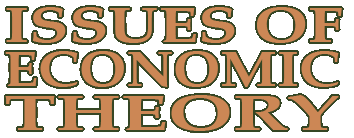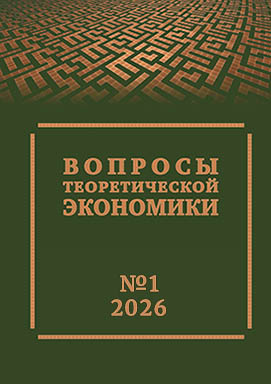| №4 (29) / 2025 |
  |
|
Release Date 10.11.2025
Borokh Olga
PhD (Economics), Leading Researcher
Institute of China and Contemporary Asia, Russian Academy of sciences (Moscow), This email address is being protected from spambots. You need JavaScript enabled to view it.
https://orcid.org/0000-0002-0109-4462
TRANSFORMATION OF THE ECONOMIC EDUCATION SYSTEM IN CHINA (THE FIRST HALF OF THE 1950s)
The paper focuses on the transformation of economic education in China in the first half of the 1950s, when Marxist political economy became part of the official ideology. Among Chinese professional economists at that time the majority had degrees from Western universities. The long-standing estrangement between Chinese “bourgeois” and Marxist economists hampered the task of smooth adaptation of old teaching staff to the new requirements. After a brief debate about the applicability of Western economics in China relates courses were excluded from university curricula. Mastering of the Russian language and Soviet academic literature by Chinese professional economists has led to noteworthy studies on the history of Russian economic thought. Imbued with a revolutionary spirit professors of the recently established People’s University of China have contributed to constructing a new model of economic education by comprehensively embracing the Soviet experience. The task was to move from educating a small number of experts in economics to the mass training of teachers of Marxist political economy, and to establish a collectivist educational system. It was not easy to connect Soviet political economy with Chinese reality when Chinese economists had not yet grasped the new theory, while Soviet experts did not fully understand Chinese specifics. The debate in the early 1950s about the factors of productive forces demonstrated the commitment of Soviet lectures to the Stalinist interpretation, which was not accepted by some Chinese economists. Successes in implementing the Soviet model were questioned within China as an unwanted manifestation of “dogmatism”. Through close acquaintance with Soviet political economy Chinese economists formed their own opinion about it, thus moving from copying to paying greater attention to national characteristics.
Keywords: Marxist political economy, Western economics, Peking University, People’s University of China, Soviet experts
JEL: B2, B24, A2
UDC: 330.85
DOI: 10.52342/2587-7666VTE_2025_4_117_132
© O. Borokh, 2025
© Institute of Economics of the Russian Academy of Sciences «Issues of Theoretical Economics», 2025
ЛИТЕРАТУРА
- History of the All-Union Communist Party (Bolsheviks). Brief course (1938).
- People’s Republic of China: Political and economic developments in 1973 (1975).
- Marx K. (1960). Capital. Vol. 1] // Marx K., Engels F. (1960). Works. 50 vols. Vol. 23.
- PivovarovaP. (1989). Economic science in China: 40 years of development.
- Radishchev A.N. (1949a). Selected works.
complete reference list
close list
- Radishchev A.N. (1949b). Selected philosophical works.
- Baodeliefu [Boldyrev] (1953). Guanyu kexue yuanjiu gongzuo – Sulian zhuanjia Baodeliefu tongzhi wu yue liu ri zai caizheng jiaoyanshi de baogao jilu zhaiyao [Baodeliefu (1953). On scientific research work – excerpts from the transcript of the report of the Soviet expert comrade Boldyrev at the section of finance on May 6] // Jiaoxue yu yanjiu. No. 2. Pp. 21-22. (In Chinese).
- Cheng Fangwu (1951). Zhongguo Renmin daxue de jiaoyanshi gongzuo [Cheng Fangwu (1951). Work of teaching and research sections of Renmin University of China] // Renmin ribao. 30.03.1951. (In Chinese).
- Fan Hong (1950). Guanyu zhengzhi jingjixue jiaoxue wenti de ziwo piping [Fan Hong (1950). Self-criticism on the teaching of political economy] // Renmin ribao. 01.1950. (In Chinese).
- Fan Hong (2012). Guanyu zhengzhi jingjixue jiaoxue wenti de ziwo piping [Fan Hong (2012). Self-criticism on the teaching of political economy] // Fan Hong zhuzuo ji. Shang [Fan Hong’s collection of writings. Part 1]. – Beijing: Beijing daxue chubanshe. Pp. 256-262. (In Chinese).
- Geng Huamin, Wu Qimin (2016). Sulian zhuanjia yu xin Zhongguo gaoxiao zhengzhi lilun kecheng de jianli [Geng Huamin, Wu Qimin (2016). The Soviet experts and the establishment of the political theory courses in universities in New China] // Zhonggong dangshi yanjiu. No. 6. Pp. 55- (In Chinese).
- Hayhoe R. (1996). China’s Universities 1895–1995. A Century of Cultural Conflict. – New York and London: Garland Publishing, Inc.
- Hu Shi (2001). Hu Shi riji 1950 nian 9 yue 9 ri [Hu Shi (2001). Hu Shi’s diary. September 9, 1950] // Hu Shi riji quanbian. 8 [The complete diary of Hu Shi. 8]. – Hefei: Anhui jiaoyu chubanshe. Pp. 50-51. (In Chnese).
- Jin yi bu xiang Sulian zhuanjia xuexi (Shelun) [Further learning from Soviet experts (Editorial)] (1953) // Jiaoxue yu yanjiu. No. 6. Pp. 2-3. (In Chinese).
- Li Xin (1992). Wushi niandai chu guanyu shengchanli yaosu de taolun [Li Xin (1992). Discussions on factors of productive forces in the early 1950s] // Qinghua daxue xuebao (zhexue shehui kexue). 1. Pp. 1-3. (In Chinese).
- Liu Qunyi (2021). Renmin de jingjixue: yuanxi tiaozheng zhong de Beijing daxue jingji xueke [Liu Qunyi (2021). Economics for the people: Peking university’s economic disciplines under faculty restructuring] // Dai zong yang zhi – Chen Daisun xiansheng danchen 120 zhounian jinian wenji [With respect to teacher Chen Daisun: An anthology of essays on the 120th anniversary of Mr. Chen Daisun’s birth]. – Beijing: Beijing daxue chubanshe. Pp. 229-241. (In Chinese).
- Mao Zedong (1991). Lun renmin minzhu zhuanzheng [Mao Zedong (1991). On the people’s democratic dictatorship] // Mao Zedong xuanji. Di si juan [Selected works of Mao Zedong. Vol. 4]. – Beijing: Renmin chubanshe. Pp. 1468-1482. (In Chinese).
- Mao Zedong (2013). Mao Zedong nianpu (1893–1949). Xia juan [Mao Zedong (2013). Mao Zedong сhronicle (1893–1949). Vol. 3]. – Beijing: Zhongyang wenxian chubanshe. (In Chinese).
- Sixiang gaizao luntan [Thought remolding forum] (1952) // Xin jianshe. No. 5. Pp. 53-56. (In Chinese).
- Stiffler D. (2005). Resistance to the Sovietization of Higher Education in China // Universities Under Dictatorship / J. Connelly and M. Grüttner (Eds.) – University Park, USA: Penn State University Pp. 213-244. DOI: 10.1515/9780271093499-011
- Stiffler D. A. (2007). Creating New China’s First New-Style Regular University, 1949–50 // Dilemmas of Victory / Brown and P.G. Pickowicz (Eds.). – Cambridge (Mass.): Harvard University Press. Pp. 288-308. URL: http://www.jstor.org/stable/j.ctt13x0f5f.15
- Stiffler D. (2010). “Three blows of the shoulder pole”: Soviet experts at Chinese People’s University, 1950–1957 // China learns from the Soviet Union, 1949–Present / P. Bernstein and Hua-yu Li (Eds.). – Lanham, MD: Lexington Books. Pp. 303-325.
- Sun Daquan (2020). Xin Zhongguo 70 nian lilun jingjixue yanbian yu fazhan [Sun Daquan (2020). The evolution and development of theoretical economics in 70 Years of New China] // Renwen zazhi. No. 5. Pp. 13-21. (In Chinese).
- Wang Yanan (1959). Dui woguo jingjixue jie de huigu he qianzhan [Wang Yanan (1959). Review and prospects of China’s economics circles] // Jingji yanjiu. No. 10. Pp. 38-39. (In Chinese).
- Wu Huifan (2012). Xin Zhongguo wenke gaodeng jiaoyu de «gongzuo muji» – 20 shiji wu liushi niandai Zhongguo renmin daxue de banxue tansuo yu gongxian [Wu Huifan (2012). The «mother machine» of the humanities in higher education in New China – Educational exploration and contribution of Renmin university of China in the 1950s and 1960s] // Zhongguo renmin daxue xuebao. No. 6. Pp, 140-145. (In Chinese).
- Wu Qimin, Geng Huamin (2017). Sulian zhuanjia yu Zhongguo Renmin daxue zhengzhi jingjixue lilun kecheng de jianli (1949–1957 nian) [Wu Qimin, Geng Huamin (2017). Soviet Experts and the establishment of the course on the theory of political economy at Renmin University of China] // Dangdai Zhongguo shi yanjiu. 7. Pp. 63-72. (In Chinese).
- Wu Yuzhang (1953). Zhongguo Renmin daxue san nian lai gongzuo jiben zongjie [Wu Yuzhang (1953). A basic summary of three years of work at Renmin University of China] // Renmin ribao.09.1953. (In Chinese).
- Xu Yunan (1954). Shiba shiji Eluosi xianjin sixiangjia Lajishefu he tade jingji sixiang – jingji sixiang shi de yi zhang [Xu Yunan (1954). The advanced Russian thinker of the eighteenth century, Radishchev, and his economic thought – a chapter of the history of economic thought] // Xin jianshe. 5. Pp. 35-47. (In Chinese).
- Zhang Youren (2012). Zhang Youren huiyi wenji [Zhang Youren (2012). Anthology of Zhang Youren’s memories]. – Beijing: Beijing daxue chubanshe. (In Chinese).
- Zhao Jing (2012). Dui xin Zhongguo chengli chuqi gaoxiao jiaoxue gaige zhong xuexi Sulian wenti de renshi [Zhao Jing (2012). Understanding of the problem of studying the Soviet Union in the teaching reform of colleges and universities in the early period of New China] // Dangdai Zhongguo shi yanjiu. No. 2. Pp. 63-66. (in Chinese).
- Zheng Gang, Lan Jun (2007). 20 shiji 50 niandai gaodeng jiaoyujie pinqing Sulian zhuanjia fazhan licheng, tedian ji qi yingxiang [Zheng Gang, Lan Jun (2007). History, features, and influence: on China’s employment of experts from Soviet Union in colleges and universities in the 1950s] // Jishou daxue xuebao (shehui kexue ban). 28. No. 1. Pp. 124-129. (In Chinese).
Manuscript submission date 24.08.2025
Manuscript acceptance date: 27.09.2025
For citation:
Borokh O. Transformation of the Economic Education System in China (The First of Half of the 1950s) // Voprosy teoreticheskoy ekonomiki. 2025. No. 4. Pp. 117–132. DOI: 10.52342/2587-7666VTE_2025_4_117_132.



